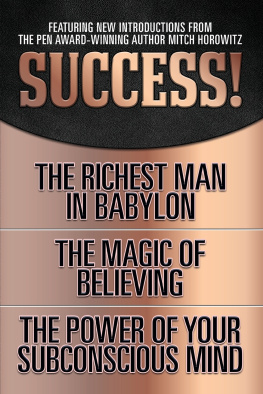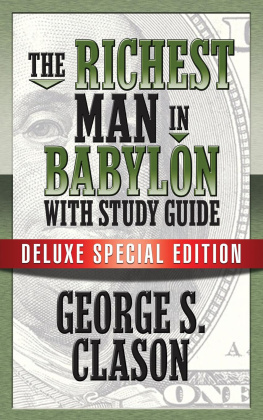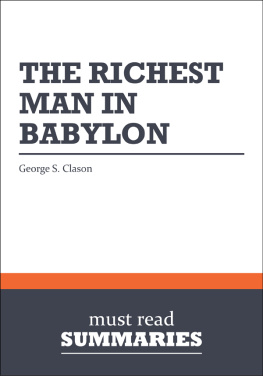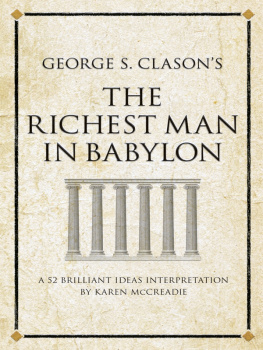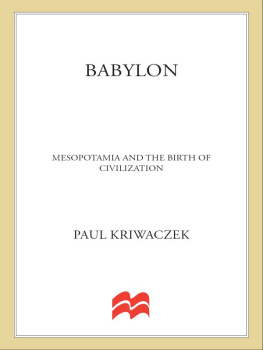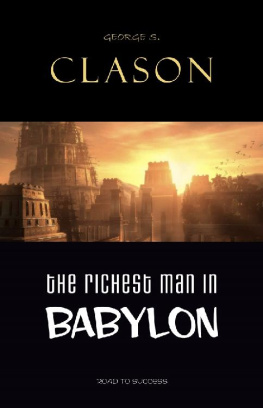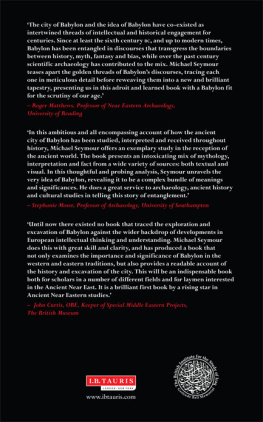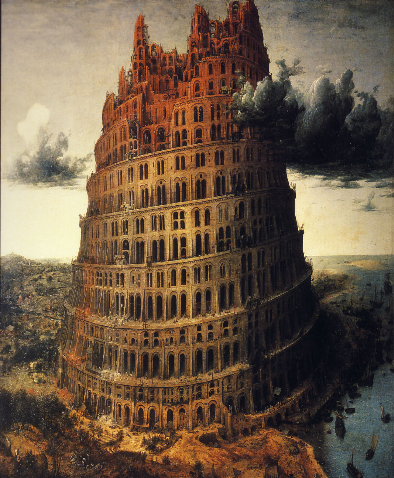Our prosperity as a nation depends upon the personal financial prosperity of each of us as individuals.
This book deals with the personal successes of each of us. Success means accomplishments as the result of our own efforts and abilities. Proper preparation is the key to our success. Our acts can be no wiser than our thoughts. Our thinking can be no wiser than our understanding. This book of cures for lean purses has been termed a guide to financial understanding. That, indeed, is its purpose: to offer those who are ambitious for financial success an insight which will aid them to acquire money, to keep money and to make their surpluses earn more money.
In the pages which follow, we are taken back to Babylon , the cradle in which was nurtured the basic principles of finance now recognized and used the world over.
To new readers the author is happy to extend the wish that its pages may contain for them the same inspiration for growing bank accounts, greater financial successes and the solution of difficult personal financial problems so enthusiastically reported by readers from coast to coast.
To the business executives who have distributed these tales in such generous quantities to friends, relatives, employees and associates, the author takes this opportunity to express his gratitude. No endorsement could be higher than that of practical men who appreciate its teachings because they, themselves, have worked up to important successes by applying the very principles it advocates.
Babylon became the wealthiest city of the ancient world because its citizens were the richest people of their time. They appreciated the value of money. They practiced sound financial principles in acquiring money, keeping money and making their money earn more money. They provided for themselves what we all desireincomes for the future.
G. S. C.
Chapter 2. The Man Who Desired Gold
Bansir, the chariot builder of Babylon, was thoroughly discouraged. From his seat upon the low wall surrounding his property, he gazed sadly at his simple home and the open workshop in which stood a partially completed chariot.
His wife frequently appeared at the open door. Her furtive glances in his direction reminded him that the meal bag was almost empty and he should be at work finishing the chariot, hammering and hewing, polishing and painting, stretching taut the leather over the wheel rims, preparing it for delivery so he could collect from his wealthy customer.
Nevertheless, his fat, muscular body sat stolidly upon the wall. His slow mind was struggling patiently with a problem for which he could find no answer.
The hot, tropical sun, so typical of this valley of the Euphrates, beat down upon him mercilessly. Beads of perspiration formed upon his brow and trickled down unnoticed to lose themselves in tie hairy jungle on his chest. Beyond his home towered the high terraced wall surrounding the king's palace. Nearby, cleaving the blue heavens, was the painted tower of the Temple of Bel. In the shadow of such grandeur was his simple home and many others far less neat and well cared for. Babylon was like this --- a mixture of grandeur and squalor, of dazzling wealth and direst poverty, crowded together without plan or system within the protecting walls of the city.
Behind him, had he cared to turn and look, the noisy chariots of the rich jostled and crowded aside the sandaled tradesmen as well as the barefooted beggars. Even the rich were forced to turn into the gutters to clear the way for the long lines of slave water carriers, on the "King's Business," each bearing a heavy goatskin of water to be poured upon the hanging gardens. Bansir was too engrossed in his own problem to hear or heed the confused hubbub of the busy city. It was the unexpected twanging of the strings from a familiar lyre that aroused him from his reverie. He turned and looked into the sensitive, smiling face of his best friend --- Kobbi, the musician.
"May the Gods bless thee with great liberality, my good friend," began Kobbi with an elaborate salute. "Yet, it does appear they have already been so generous thou needest not to labor. I rejoice with thee in thy good fortune.
More, I would even share it with thee. Pray, from thy purse which must be bulging else thou wouldst be busy in your shop, extract but two humble shekels and lend them to me until after the noblemen's feast this night. Thou wilt not miss them ere they are returned."
"If I did have two shekels," Bansir responded gloomily, "to no one could I lend them --- not even to you, my best of friends; for they would be my fortune --- my entire fortune. No one lends his entire fortune, not even to his best friend."
"What," exclaimed Kobbi with genuine surprise, "Thou hast not one shekel in thy purse, yet sit like a statue upon a wall! Why not complete that chariot? How else canst thou provide for thy noble appetite? Tis not like thee, my friend. Where is thy endless energy? Doth something distress thee? Have the Gods brought to thee troubles?"
"A torment from the Gods it must be," Bansir agreed. "It began with a dream, a senseless dream, in which I thought I was a man of means. From my belt hung a handsome purse, heavy with coins. There were shekels which I cast with careless freedom to the beggars; there were pieces of silver with which I did buy finery for my wife and whatever I did desire for myself; there were pieces of gold which made me feel assured of the future and unafraid to spend the silver. A glorious feeling of contentment was within me! You would not have known me for thy hardworking friend. Nor wouldst have known my wife, so free from wrinkles was her face and shining with happiness. She was again the smiling maiden of our early married days."
"A pleasant dream, indeed," commented Kobbi, "but why should such pleasant feelings as it aroused turn thee into a glum statue upon the wall?"
"Why, indeed! Because when I awoke and remembered how empty was my purse, a feeling of rebellion swept over me. Let us talk it over together, for, as the sailors do say, we ride in the same boat, we two. As youngsters, we went together to the priests to learn wisdom. As young men, we shared each other's pleasures. As grown men, we have always been close friends. We have been contented subjects of our kind. We have been satisfied to work long hours and spend our earnings freely. We have earned much coin in the years that have passed, yet to know the joys that come from wealth, we must dream about them. Bah! Are we more than dumb sheep? We live in the richest city in all the world. The travelers do say none equals it in wealth.


